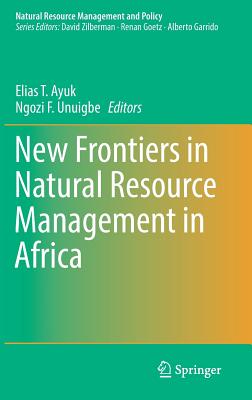This book discusses policy strategies for the effective management of natural resources in Africa within the context of the United Nations' Sustainable Development Goals (SDG). While natural resource wealth has the potential to lift many out of poverty, sustain economic growth, and foster political stability, it does not guarantee these benefits. The absolute levels of human development in many resource-rich countries remain low, despite their apparent wealth. The challenge is to adopt policies that better harness the potential of natural resources, not only as an opportunity for development, but also to foster policies and institutional innovations that manage resource wealth equitably and boost human capital. To this end, this volume highlights key opportunities and solutions for harnessing natural resources for sustained economic development and explain how such approaches should be incorporated into the SDG agenda. These opportunities are communicated in the form of policy recommendations that in some cases, are country specific but can (and should) be adapted by individual African countries where applicable. With a broad perspective supplied by a diverse group of authors, this book will be useful for graduate students and academicians studying Africa, development economics, economic policy, and resource management, as well as policy makers, NGOs, and IGOs.
本書探討在聯合國可持續發展目標(SDG)背景下,非洲自然資源有效管理的政策策略。儘管自然資源的財富有潛力使許多人擺脫貧困、維持經濟增長並促進政治穩定,但這並不保證能帶來這些好處。許多資源豐富國家的絕對人類發展水平仍然較低,儘管它們表面上擁有財富。挑戰在於採取更好地利用自然資源潛力的政策,不僅將其視為發展的機會,還要促進公平管理資源財富的政策和制度創新,並提升人力資本。為此,本書強調了利用自然資源促進持續經濟發展的關鍵機會和解決方案,並解釋這些方法應如何納入SDG議程。這些機會以政策建議的形式傳達,在某些情況下是針對特定國家的,但可以(且應該)由各個非洲國家根據需要進行調整。這本書由多位作者提供廣泛的視角,將對研究非洲、發展經濟學、經濟政策和資源管理的研究生和學者,以及政策制定者、非政府組織和國際政府組織有所幫助。
Dr Elias Takor Ayuk is the Director of the United Nations University Institute for Natural Resources in Africa (UNU-INRA). He has over 20 years experience in Sub-Saharan Africa on development issues including institutional capacity building, poverty reduction, food security, natural resources management, strategic planning and development funding.Prior to joining UNU-INRA, Dr Ayuk has served as a Senior Programme Specialist with the Globalization, Growth and Poverty (GGP) programme of the International Development Research Centre (IDRC) at the Regional Office for West and Central Africa, in Dakar, Senegal, from 2004 to 2010. He was responsible for project development, management and monitoring of the IDRC's GGP program in West and Central Africa. He also served as Acting Executive Director of the Secretariat for Institutional Support for Economic Research in Africa (SISERA/IDRC), Dakar, Senegal from 2002 to 2006.
Dr Ngozi Stewart is a specialist in Environmental Law and Ethics. Her core areas are in fostering ecological integrity including biodiversity conservation, environmental policy and regulation, coastal management, sustainability issues in aviation, food security and climate change. She is currently a research fellow in environmental policy at the United Nations University Institute for Natural Resources in Africa (UNU-INRA).
Praise Nutakor is a Communication Specialist with over seven years' experience in the communications field. She is currently the Communications and Public Relations Associate of the United Nations University Institute for Natural Resources in Africa (UNU-INRA), heading the Institute's communications unit.
艾利亞斯·塔科爾·阿尤克博士是聯合國大學非洲自然資源研究所(UNU-INRA)的所長。他在撒哈拉以南非洲擁有超過20年的發展議題經驗,包括機構能力建設、減貧、糧食安全、自然資源管理、戰略規劃和發展資金。在加入UNU-INRA之前,阿尤克博士曾擔任國際發展研究中心(IDRC)西非和中非區域辦事處的全球化、增長與貧困(GGP)計劃的高級項目專家,任職於塞內加爾達喀爾,時間為2004年至2010年。他負責西非和中非IDRC GGP計劃的項目開發、管理和監測。他還曾於2002年至2006年擔任非洲經濟研究機構支持秘書處(SISERA/IDRC)的代理執行主任,任職於塞內加爾達喀爾。
恩戈齊·斯圖爾特博士是環境法與倫理的專家。她的核心領域包括促進生態完整性,包括生物多樣性保護、環境政策與法規、沿海管理、航空可持續性問題、糧食安全和氣候變遷。她目前是聯合國大學非洲自然資源研究所(UNU-INRA)環境政策的研究員。
普雷斯·納塔科爾是一位擁有超過七年經驗的傳播專家。她目前是聯合國大學非洲自然資源研究所(UNU-INRA)的傳播與公共關係助理,負責該研究所的傳播單位。











